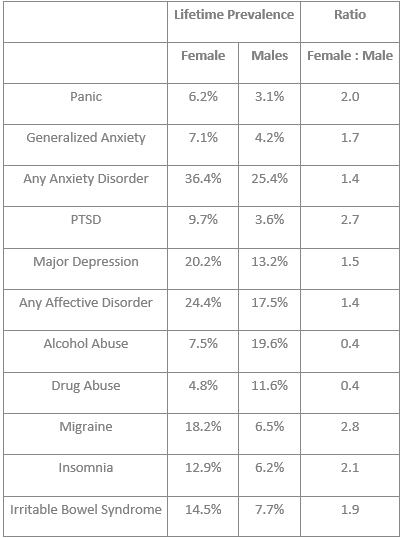Learn why leading HR professionals trust ekincare! Explore Now

Mental health can be defined as “a state of well-being in which every individual realizes his or her potential, can cope with the normal stresses of life, can work productively and fruitfully, and can contribute to his or her community.” Positive psychology or holism looks at mental health as individual’s ability to enjoy life and procure a balance between life activities and efforts to achieve psychological resilience.
Is there a difference in mental health and related issues between genders? Are men and women affected differently?There are multiple causative or the etiological factors that act as determinants of mental health and mental illness, among them gender and sex play a major role. The difference between males and females biologically is referred to as sex, while the behaviors and roles one exhibits in society refer to Gender.
The predisposing factors and vulnerabilities vary widely. Different attributes like physical, physiological and psychological contribute to differences between men and women in how they communicate, express in relationships, how they process information and how they react to events and stress. Gender differences have been observed not only in the rates of common mental disorders but also in the course, age of onset, severity, long term prognosis. The interplay of nature and nurture which is the genetic predisposition and experiences one has in society shapes how mental health issues are developed and the influence it has on ones well being.
Predisposing factors for women: Understanding the contributing factors to various conditionsBiological factors
All these directly or indirectly increase the risk in women for developing mental health issues.
Socio cultural factors
Work place factors
It has been observed in LinkedIn Opportunity index that favoritism towards at men at work is perceived by 22% of working women. 85% felt that they missed out on a raise, promotion, or salary hike due to their gender. 69% of working mothers felt discrimination due to household and family responsibilities.
Depression
Studies have shown that women are more likely than man to experience depression. There is specific type of depression which are unique to women. Symptoms of irritability, restlessness mood changes prior to menstrual cycle (Premenstrual dysphoric disorder), mood changes and symptoms following child birth (postpartum depression), symptoms around menopause (Premenopausal depression)
Stress and burnout
Women tend to experience more physical symptoms of stress like headache, fatigue, changes in appetite than men.
The life time prevalence of anxiety disorders is higher in women when compared to men and also it is found that symptoms are more disabling in women. lifetime prevalence rates for any anxiety disorder were 30.5% for women and 19.2% for men. Women tend to have more co morbid depression and continuous course.
Women are twice likely as men to develop eating disorders like binge eating, anorexia and bulimia. The causative factors could be poor body image, perceived socially acceptable norms, body shaming and chronic dieting.
Addictions
Although men are more likely than women to develop addictions, women are more susceptible to cravings and relapse Post traumatic stress disorder.
Women and children are among the majority of individuals who experience violent conflicts, displacement from homes and other traumas. Women are 2-3 times more likely than men to develop PTSD. The difference of threat perception, emotional coping in women may contribute to these differences.
Sleep disturbances
Studies have shown that females had a significantly high prevalence of insomnia than men.
Table showing sex differences in prevalence of stress-related disorders.

Women self help groups
Self help groups are usually peer led and informal, these can offer autonomy and space where one can vent their experiences, thoughts and emotions. Along with providing a sense of support it aids in assisting one another in coping, advising and recovering.
Awareness sessions
Employees should be made aware of the available resources. Talks on mental health and its importance, stress management programs and allotting weekly slots to check in with the employees to discuss about their concerns.
Prioritizing work life balance
It is an individual responsibility and also of the organization to encourage their employees to prioritize their health. Practicing setting boundaries and unplugging when required both at professional and personal front needs to be encouraged.
Maintaining transparency regarding the role requirements, expectations and salaries.
Policies to prevent bullying and harassment at work. Employees should be made aware of the steps to speak about harassment, persons to be approached and the process to file a complaint.
Flexible and sustainable ways of working
Benefits that support mental health
Organizations and companies should consider formulating policies that include mental health in health care plans and design employee assistance programs and offer customized health assessments. Giving “mental health days” when an employee needs a break and steps to facilitate early help seeking.
Workplace ergonomics
Women are more prone to musculoskeletal disorders, infections and obesity. Increasing the availability and accessibility of work place ergonomics will help reduce stress and encourage healthy life style.
Conclusion
It is widely accepted that for a healthy individual or organization mental health is as important as physical health. However, understanding the unique vulnerabilities and needs of women offers organizations to better support women at work place. Integrating various policies to improve wellbeing in an organization will not only enable to address the challenges and mental health issues faced by an employee but also efficiently manage the psychosocial risk factors contributing to this.
Consider providing your female employees with a personalized and flexible wellness plan that caters to their unique needs. Contact us to schedule a demo and learn more about the tailored wellness solutions available through ekincare.